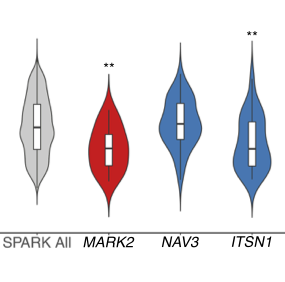Abstract
Despite the known heritable nature of autism spectrum disorder (ASD), studies have primarily identified risk genes with de novo variants (DNVs). To capture the full spectrum of ASD genetic risk, we performed a two-stage analysis of rare de novo and inherited coding variants in 42,607 ASD cases, including 35,130 new cases recruited online by SPARK. In the first stage, we analyzed 19,843 cases with one or both biological parents and found that known ASD or neurodevelopmental disorder (NDD) risk genes explain nearly 70% of the genetic burden conferred by DNVs. In contrast, less than 20% of genetic risk conferred by rare inherited loss-of-function (LoF) variants are explained by known ASD/NDD genes. We selected 404 genes based on the first stage of analysis and performed a meta-analysis with an additional 22,764 cases and 236,000 population controls. We identified 60 genes with exome-wide significance (p < 2.5e-6), including five new risk genes (NAV3, ITSN1, MARK2, SCAF1, and HNRNPUL2). The association of NAV3 with ASD risk is entirely driven by rare inherited LoFs variants, with an average relative risk of 4, consistent with moderate effect. ASD individuals with LoF variants in the four moderate risk genes (NAV3, ITSN1, SCAF1, and HNRNPUL2, n = 95) have less cognitive impairment compared to 129 ASD individuals with LoF variants in well-established, highly penetrant ASD risk genes (CHD8, SCN2A, ADNP, FOXP1, SHANK3) (59% vs. 88%, p= 1.9e-06) . These findings will guide future gene discovery efforts and suggest that much larger numbers of ASD cases and controls are needed to identify additional genes that confer moderate risk of ASD through rare, inherited variants.
A preprint version is available at medRxiv: https://doi.org/10.1101/2021.10.08.21264256
